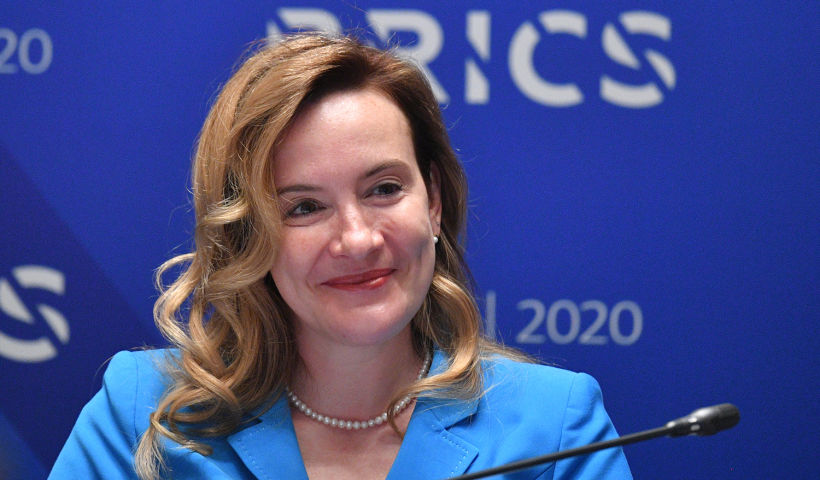The BRICS Civil Forum started on 23 September.
The first day of the Forum included two panel sessions – “Measures to Combat COVID-19 in the BRICS Countries and Steps to Provide Large-Scale Testing and Vaccination” and “Urge for a Positive Change: Multidimensional Cooperation in Education and Science”. The experts discussed topical issues of the public institutions’ response to the novel coronavirus pandemic, as well as cooperation among the BRICS countries in education and science and the possible deepening of social and cultural ties.
We spoke about the main discussion issues of the Forum with Victoria Panova, Co-Chair of the BRICS Civil Forum, Managing Director of the National Committee on BRICS Research, Scientific Supervisor of the BRICS Russian Organising Committee Expert Council and Vice President for International Relations of Far Eastern Federal University.
- Ms Panova, the BRICS Civil Forum has started. What expectations do you have for this event? Have you outlined any goals, which, once achieved, would make it possible for you to say YES, the forum was a success?
This year, expectations are particularly high, since Russia is acting not only as the host, but also a country that spearheaded the creation of this format. As you are aware, the mission of civil process is to convey the vision and needs of public to our countries’ leaders. It is not enough to come up with proposals; it is important to make sure that they can grow into tangible projects that can be put to good use. So, we will be able to discuss the Forum results later, not only in terms of creativity of the ideas presented in the recommendations (there are a lot of them) to the Leaders, but also by their practicality. It is important to understand that there are things that depend on civil society, on efficient and concerted efforts of our non-governmental organisations and on the dialogue between the BRICS countries’ civil societies. Seen from this angle, the Forum provides an ideal platform for having such interaction and launching joint initiatives. At the same time, much depends on whether the governments of our countries are ready to hear what their civil societies have to tell them. We hope that here, too, we will see the results of our efforts in the final documents and subsequent actions of our five countries’ officials.
- It’s impossible to ignore the pandemic, which has certainly affected all spheres of our life. To what extent can the Forum become an additional factor to bring back the pre-COVID-19 living standards?
I think it has already become such an incentive. We miss our colleagues from the BRICS countries now here in Moscow. Of course, despite the advanced technologies we are now using to keep in touch and to keep working, it cannot replace in-person communication. It is not surprising that the issue of combating the pandemic from various angles found its reflection in the agenda of each Forum session, and civil society is making every effort to help our countries overcome the crisis as soon as possible.
- What new trends have taken shape this year in the wake of the pandemic? We may talk about the rapid development of distance learning, but is there anything else?
COVID-19 took us online in many, if not all, areas of life. Specialists around the world are forced to accept the new reality, to develop information technologies and to offer services in a new online format.
COVID-19 has impacted healthcare and the IT industry more than anything else. The pandemic gave a powerful boost to telemedicine, and medical infrastructure is making strides based on the new needs. To avoid the spread of infection, new apps, devices and even robots are there in some countries to address new medical problems, primarily, in a contact-free way. This includes checking the temperature, disinfecting premises, scanning patients’ health status, delivering medications, and providing online medical services.
Another trend includes changes in consumption patterns and the question of whether this trend is in line with the global sustainable development agenda. On the one hand, we can observe progress in the production of personal protective equipment and medications and, on the other hand, environmental pollution as it occurs amid the pandemic. The consumer priorities are now shifting from an environmentally-friendly model to disposable packaging due to a new understanding of the role it plays in maintaining product safety and integrity. However, a number of entrepreneurs began to actively promote sustainable consumption patterns during the pandemic and, hopefully, this trend will prevail.
- What will the post-COVID era be like? Do you think the main differences between this era and life before the pandemic can already be identified?
This issue is widely discussed. However, the COVID era is not over yet. The novel coronavirus pandemic aggravated the international environment and exposed problems that have long been ignored. From the international politics perspective, we can say that there’s less trust in global governance institutions and the global agenda priorities are changing. Today, as never before, the priorities related to the value of human life and human rights protection have come to the fore. I’m confident that this trend will remain unchanged as the underlying principle of the BRICS activities.
We can take note of political and economic confrontation between certain nations and the attempts to accuse each other instead of focusing on provision of humanitarian aid. I think that the new era can be described as an era of global competition for leadership and weakening of international institutions. In addition, high technologies will become even more important in the new “race,” and we will confidently stride towards the Fifth Industrial Revolution.
